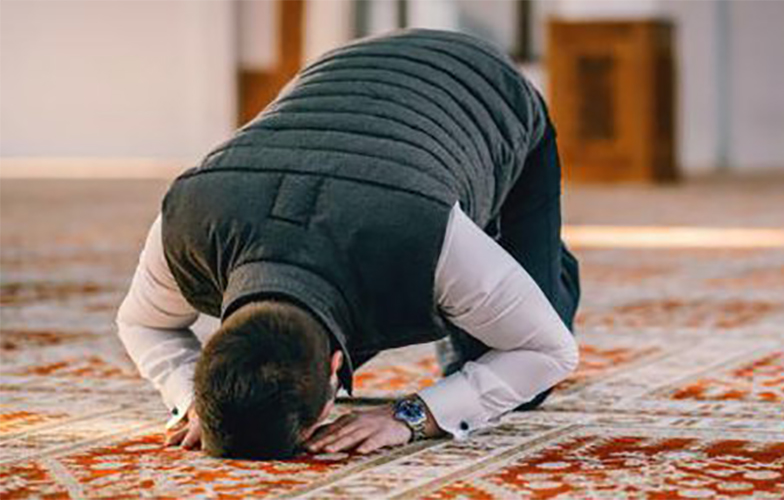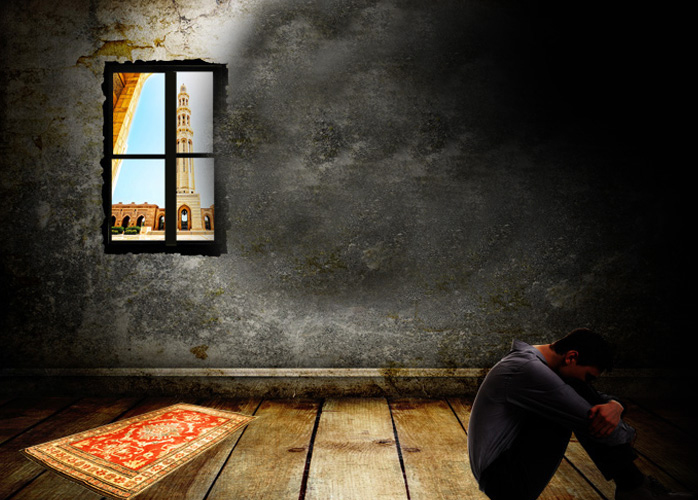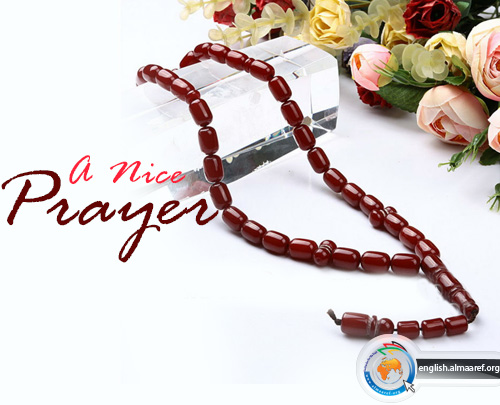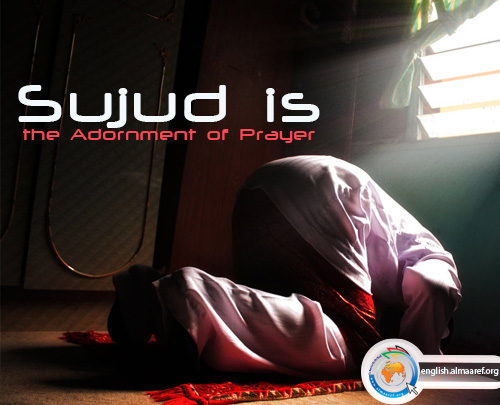The prayer is made up of eleven divisions. Some of these divisions are
called the basic elements, the intentional or unintentional add or delete of
which leads to the abolishment of the prayer. And some of these divisions are
called the parts, only the intentional add or delete of which leads to the
abolishment of the prayer.
The Basic Elements
The basic elements of the prayer are:1
1- The intention
2- Saying, “God is Great” in starting the prayer
3- Standing straight while saying, “God is Great” in starting the prayer
and while standing before bowing
4- Bowing
5- Prostrating (the two prostrations with each other)
The Parts
The parts of the prayer are:2
1- The recitation
2- The extolment
3- Bearing the two witnesses: “There is no god but God and Mohammad is God’s
Messenger” after the second bow
4- The bestowal of peace at the end of the prayer
The Duties of the Prayer in Details
Intention
It is meant by this to intend to perform the deed. It is not conditional to
utter it or to think about it. What must be considered in it is getting close to
The Most High God and specifying the sort of the prayer to be performed.3
Saying “God Is Great” in Starting the Prayer
God Is Great [Allahu Akbar] must be said while standing straight4. It
is not permissible to join to it something before it; it must be uttered alone.
5
When saying, “God is Great”, it is desirable to raise the two hands to
the ears or near the face, thus starting with “God is Great” with the
start of the raising of the hands and ending “God is Great” with the end
of the raising of the hands.6
Standing Straight
It is dutiful to be straight, as much as possible and according to the state
of the performer of the prayer, while standing.7 In case the
performer of the prayer is unable to stand in any form even by leaning to
something, then he must perform the prayer according to the following order:
A- In case he is unable to stand, he must perform the prayer while sitting, and
then he must bow on his knees and prostrate normally.
B- In case he is unable to sit, he must perform the prayer while sleeping to the
right side.
C- In case he is unable to sleep to his right side, he must perform the prayer
while sleeping to his left side.
D- In case he is unable to sleep to the left side, then he must perform the
prayer while laying on his back like the dying person, thus using his head or
eyes to signal for his bowing and prostration.8
The Recitation
- In the first and second bows, it is dutiful to recite Al-Fatihah [The
Opening] Chapter and then any complete chapter he wishes9. During the
morning, sunset, and evening prayers, it is dutiful on the man only to raise his
voice while reciting; on the other hand, the woman is given the choice to raise
or lower her voice while reciting.10 During the noon and the
afternoon prayers, it is dutiful on both the man and the woman to lower their
voice while reciting.11
- It is not permissible to recite the Azaem chapters during the prayer i.e. Al-Alaq,
Al-Najem, Al-Sajda, and Fossilat.12
- Al-Feel [The Elephant] and Qouraish chapters are considered to be one chapter
in the prayer, so reciting one of them does not settle for the prayer. Likewise
is the case with Al-Doha [The Forenoon] and Al-Inshirah [The Opening Forth]
chapters.13
The Extolment
The extolment comes in three contexts:
1- The first one is the extolment which takes the place of the recitation in the
third and fourth bows. Its form is “Subhanal Lah Wal Hamdu Lillah Wa La Ilaha
Illal Lah Wal Lahou Akbar” once, and it is a desirable cautiousness to say it
thrice.14 It can be replaced with the recitation of Al-Hamid [The
Praise/ The Opening] chapter without any chapter after it.15
- In case the performer of the prayer ignorantly or forgetfully lowers his voice
in the position where he must raise his voice or raises his voice in the
position where he must lower it, his prayer is considered to be correct. Still,
he has to abide by this rule once he adverts to it.16
2- The second one is the extolment mentioned during bowing17. In the
extolment, the religiously responsible person is given the alternative to choose
between:
- Saying, “Subhana Rabbyal Atheem Wa Bihamdeh” [Glorified and Praised be my
God The Most Great] once
- And saying any extolment like: “Subhanal Lah” [Glorified be God] thrice
3- The third extolment is the one dutiful during the prostration. Here also is
the religiously responsible person given the alternative to choose between:
- Saying, “Subhana Rabbyal Aala Wa Bihamdeh” [Glorified and Praised be my God
The Most High] once
- And saying any extolment like: “Subhanal Lah” thrice
Bowing
The how of bowing is that the performer of the prayer must bend in a way
that the palms of his hands reach his knees.18 It is dutiful to extol
God during it as we mentioned above19, and it is conditional that one
be stable during the extolment.20
Prostrating
The how of prostration is that the performer of the prayer must put on the
earth his seven organs of prostration i.e. his forehead, his two palms, his two
knees, and the tips of the forefingers of the two feet.
As is the case during the bowing, the extolment and stability are also two
conditions here.21 And the seven organs must be in their positions
during the extolment: In case the performer of the prayer wants to move his
hand, for instance, he must stop talking at first, move his hand, bring it back
to the earth, and then continue the extolment.22
Bearing Witness
It is dutiful to say while bearing witness, “I witness that there is no god
but God, He is One with no partner. And I witness that Mohammad is His servant
and prophet. O my God! Bestow your prayers upon Mohammad and his Household!”
* When Must One Bear Witness
When one sits stably23, he must bear witness in the following
form:24
- First: In the prayer which is made up of two bows, one must bear
witness once in the second bow.
- Second: In the prayer which is made up of three bows, one must bear
witness twice, one in the second bow and the other one in the third bow.
- Third: In the prayer which is made up of four bows, one must bear
witness twice, one in the second bow and the other one in the fourth bow.
Bestowing Peace
One must bestow peace while sitting stably in the last bow after having born
witness.25 Bestowing peace may be in one of the following two forms:
- First: “Peace be upon you” [Assalamou Alaykom], and it is
desirable to add, “God’s Peace, Mercy, and Blessings be upon you.”26
- Second: “Peace be upon us and upon God’s righteous servants.” It
is preferred that bestowing peace takes the following form: “God’s Peace,
Mercy, and Blessings be upon you, O Prophet! Peace be upon us and upon God’s
righteous servants! God’s Peace, Mercy, and Blessings be upon you.”
The Conditions of the Acts
1- Succession: Succession must be considered, so that the form of the prayer
will not break up, whether between the acts such as the long interval between
Al-Fatihah and the chapter after it, or within the acts themselves such as the
long intervals between the verses of Al-Fatihah chapter.27
2- Arrangement of the Acts
The Desirable Acts
The Supplication
It is desirable in the second bow before bowing.28 And it may include
any extolment of God and supplication; there is no special saying which is
conditional.
Following Up the Prayer with Extolment
It is desirable to follow up the prayer with extolment even if it is a
supererogatory prayer; still, the desirability of this after the dutiful prayer
is sure. It is meant here to occupy oneself with supplication, glorification of
God, recitation of The Noble Qur’an, and the like. The time of this is
immediately after having done with the prayer.29
It is preferred to read the following up extolments related to the Household
(God’s peace bestowed upon them), especially the glorification of the Pure
Honest Sayyda Fatima Al-Zahraa (God’s peace bestowed upon her) which is as
follows:
First: Allahu Akbar [God is Great] thirty four times
Second: AlHamdu Lillah [Praise be to God] thirty three times
Third: Subhanal Lah [Glorified be God] thirty three times
1- Tahreer Al-Waseela
[Editing the Means] / Part One/ Page 156
2- Tahreer Al-Waseela / Part One/ Page 156
3- Tahreer Al-Waseela [Editing the Means] / Part One/ Page 156/ Question 1
4- Tahreer Al-Waseela/ Part One/ Page 161
5- Tahreer Al-Waseela/ Part One/ Page 161/ Question 1
6- Tahreer Al-Waseela/ Part One/ Page 62/ Question 4
7- Tahreer Al-Waseela/ Part One/ Page 62/ Question 2
8- Tahreer Al-Waseela [Editing the Means] / Part One/ Page 16/ Part One/ Page3/
Question 5
9- Tahreer Al-Waseela/ Part One/ Page 164/ Question 1
10- Ajweebat Al-Istifta’at [The Answers to the Consultations] / Part One/ Page
134/ Questions 460
and 470
11- Ajweebat Al-Istifta’at/ Part One/ Page 134/ Question 460
12- Tahreer Al-Waseela/ Part One/ Page 165/ Question 4
13- Tahreer Al-Waseela/ Part One/ Page 165/ Question 4
14- Tahreer Al-Waseela/ Part One/ Page 168/ Question 17
15- Ajweebat Al-Istifta’at/ Part One/ Page 137/ Question 469
16- Ajweebat Al-Istifta’at [The Answers to the Consultations]/ Part One/ Page
134/ Question 458
17- Ajweebat Al-Istifta’at/ Part One/ Page 140/ Question 479- Tahreer Al-Waseela
[Editing the Means]
/ Part One/ Page 171/ Question 7
18- Tahreer Al-Waseela/ Part One/ Page 170/ Question 1
19- Tahreer Al-Waseela/ Part One/ Page 171/ Question 8
20- Tahreer Al-Waseela/ Part One/ Page 171/ Question 8
21- Tahreer Al-Waseela/ Part One/ Page 172/ Question 1
22- Tahreer Al-Waseela/ Part One/ Page 172/ Question 1
23- Tahreer Al-Waseela [Editing the Means] / Part One/ Page 180/ Question 2
24- Tahreer Al-Waseela/ Part One/ Page 180/ Question 1
25- Tahreer Al-Waseela/ Part One/ Page 180/ Question 2
26- Tahreer Al-Waseela/ Part One/ Page 181/ Question 1
27- Tahreer Al-Waseela/ Part One/ Page 182/ Question 1
28- Tahreer Al-Waseela [Editing the Means] / Part One/ Page 183/ Question 1
29- Tahreer Al-Waseela/ Part One/ Page 184/ Question 1




















